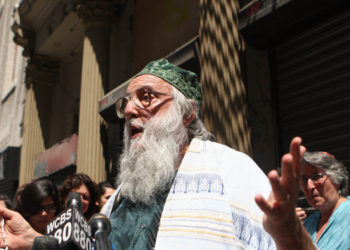This week, I have a few observations.
On the New York Mayoral Race
Here’s what Mayor Eric Adams of New York, endorsing the former governor, Andrew Cuomo, had to say about the prospect of Zohran Mamdani, the Democratic nominee, in Gracie Mansion:
“New York can’t be Europe, folks,” Adams said. “Those Islamic extremisms that are burning churches in Nigeria, that are destroying communities in Germany, that have taken over the logical thinkings. And that’s what I’m fighting for,” he continued.
Cuomo, too, has indulged anti-Muslim prejudice as the city’s mayoral campaign enters its final leg. On Thursday, for example, he chuckled as the radio host Sid Rosenberg called Mamdani a “terrorist.” “God forbid, another 9/11. Can you imagine Mamdani in the seat?” Cuomo asked. “He’d be cheering,” Rosenberg replied.
This came after Cuomo’s campaign was criticized for releasing — and then quickly deleting — an A.I.-generated video that depicted a New York under siege from kaffiyeh-wearing criminals.
Overall, one of the stories of Mamdani’s bid to run the nation’s largest city is the open and explicit Islamophobia of both opponents and people who are, ostensibly, on his side. Over the summer, for example, Senator Kirsten Gillibrand of New York falsely accused Mamdani of making “references to global jihad” for which she had to apologize. And Republicans, such as Representative Elise Stefanik, have called Mamdani, who is vocally pro-Palestinian, a “a full-blown jihadist.”
It is worth saying, on that last point, that Mamdani is more aligned with the voting base of the Democratic Party than most of its leaders in Congress. As Y.L. Al-Sheikh observes in a piece for The Nation, “Two years of genocide in Gaza and intensified apartheid across the rest of occupied Palestine have severely degraded the public’s perception of U.S. support for Israel.”
According to the Pew Research Center, 77 percent of Democrats have a negative view of the Israeli state, and according to a recent New York Times/Siena poll, nearly 60 percent of Democrats believe that Israel is intentionally killing civilians in Gaza.
The ground is shifting. Democratic politicians are facing ever more scrutiny from their voters when it comes to support for Israel. It will be interesting to see which Democrats, if any, move with it.
On the East Wing
When asked whether President Trump had any other significant plans for altering the White House, apropos the recent demolition of the structure’s East Wing, Karoline Leavitt, the White House press secretary, explained that “at this moment in time, of course, the ballroom is really the president’s main priority.”
The context makes clear that this isn’t an absolute statement about the president’s overall priorities. At the same time, it might as well have been, since there is no evidence that Trump cares about anything else happening in Washington.
To wit, the government is shut down, countless federal employees are working without pay, millions of Americans are poised to lose SNAP benefits, and the economy is buckling under the weight of the president’s tariffs and trade policies. But Trump, of course, is most concerned with his $300 million ballroom, paid for with contributions from private interests and wealthy supporters, many of whom have, or could have, a stake in the business of government.
If this sounds like rank corruption, that’s because it is. Trump, in fact, does not seem to have any interest or priority other than enriching himself, either by corrupt schemes run through his children, through “contributions” and “gifts” from his billionaire backers, or by demanding hundreds of millions of dollars in recompense from the Department of Justice, drawn from the nation’s treasury.
A Congress with the self-respect to want to defend its constitutional prerogatives might choose to do something about this. The Congress we have has all but dissolved itself.
As for the demolition itself — a premeditated act that Trump lied about in a typical display of his pathological dishonesty — is there a better illustration of what it means, and what it has meant, to Make America Great Again?
On Trump’s Caribbean Killing Spree
On Thursday, the president told reporters that he would continue his strikes in the Caribbean, and maybe even carry out attacks on the Venezuelan mainland, without congressional authorization.
“I don’t think we’re going to necessarily ask for a declaration of war,” said Trump. “I think we are just going to kill people that are bringing drugs into our country, OK? We are going to kill them, you know? They are going to be, like, dead.”
It should be said, here, that we have seen no evidence that these boats are bringing drugs into the United States. Hell, we have no evidence that the people on these boats are guilty of anything other than being in the wrong place at the wrong time. There is also no apparent legal basis for the use of military force. The president may say that he has an inherent Article II power as commander in chief to defend the nation, but even this requires him to show the legality of his operation — that he is using force against legitimate military targets who would be treated as combatants under international and domestic law.
Drug smugglers have, traditionally, been treated as ordinary criminals. You don’t summarily execute them. You board their vessels, arrest them if necessary and file criminal charges.
If Trump is going to be killing anyone in the Caribbean he deems a threat to the United States — without any attempt to publicly establish a legal rationale or show evidence — then these aren’t “strikes” or “interventions.” Donald Trump, under the guise of national security, is engaged in a killing spree.
What I Wrote
My column this week was on the “No Kings” protests and what their significance might be:
The proximate aim of the “No Kings” protests was to demonstrate — to the public as much as to politicians, business leaders and other prominent members of civil society — that the supposed “vibe shift” of the 2024 election was a mirage and that, far from being the avatar of some imagined authentic American, Trump is just a politician, and an unpopular one at that. But part of the power of mass protest is that even when orderly it is unpredictable; no one truly knows who is watching, who is changed, who is inspired.
On the latest episode of my podcast with John Ganz, we discussed the 1997 action film “Tomorrow Never Dies.”
Now Reading
David Austin Walsh on the conservatives who think Trump isn’t going far enough for Boston Review.
Willa Glickman on Curtis Sliwa for The New York Review of Books.
Grace Segers on political “authenticity” for The New Republic.
Maya Meredith on Zohran Mamdani’s outreach to Black New Yorkers for Hammer & Hope magazine.
Tariq Ali on the Gaza cease-fire for New Left Review.
Photo of the Week
A corn maze (maize?) outside of Waynesboro, Va.
Now Eating: Chewy Pumpkin Chocolate Chip Cookie Bars
I am a fellow at the Georgetown Institute of Politics and Public Service this semester and as part of my weekly discussion sections with students, I bring baked goods from home. For next week, I plan to bring these cookie bars, which are easy to put together and always a hit. Recipe from NYT Cooking.
Ingredients
-
¾ cup/170 grams unsalted butter (1½ sticks)
-
Nonstick cooking spray or neutral oil
-
1 ¾ cups/385 grams packed light brown sugar
-
¾ cup/170 grams canned pumpkin purée (not pumpkin pie filling)
-
2 teaspoons vanilla extract
-
2 ½ cups/320 grams all-purpose flour
-
2 teaspoons ground cinnamon
-
1 teaspoon baking powder
-
1 teaspoon baking soda
-
1 teaspoon kosher salt (such as Diamond Crystal)
-
1 teaspoon ground ginger
-
¼ teaspoon ground cloves
-
¼ teaspoon ground nutmeg
-
1 ½ cups/9 ounces bittersweet or semisweet chocolate chips
Directions
In a small saucepan, melt the butter over medium heat. Continue cooking, stirring constantly to prevent the milk solids from burning, until the butter foams, darkens into a light amber color and becomes fragrant and nutty, about three to four minutes more. Immediately pour the butter along with any of the browned milk solids into a large heatproof mixing bowl. Let cool for 20 minutes until warm but no longer hot.
While the butter cools, heat the oven to 325 degrees. Grease a 9-by-13-inch metal or glass baking pan with cooking spray or oil and line with a strip of parchment paper that hangs over the two long sides to create a sling.
Add the brown sugar, pumpkin purée and vanilla extract to the cooled butter and whisk until smooth and glossy. Add the flour, cinnamon, baking powder, baking soda, salt, ginger, cloves and nutmeg and stir with a spatula just until a soft dough forms with no pockets of unincorporated flour. Add 1¼ cups/216 grams of the chocolate chips and stir to evenly distribute throughout the dough.
Transfer the dough to the prepared baking pan and press into an even layer using a spatula or clean hands coated with nonstick spray or oil. Sprinkle the top with the remaining chocolate chips, pressing them in so they stick. Bake until the bars are puffed, the top is lightly browned and a skewer or knife inserted into the center comes out clean with just a few moist crumbs attached or with smudges of melted chocolate, 30 to 45 minutes.
Let the bars cool in the pan on a wire rack for at least 1 hour. Using the parchment paper, lift the bars out of the pan and cut into 24 squares. The cookie bars will keep in an airtight container at room temperature for up to five days.
Jamelle Bouie became a New York Times Opinion columnist in 2019. Before that he was the chief political correspondent for Slate magazine. He is based in Charlottesville, Va.
The post Trump’s Path of Destruction Is Far-Reaching appeared first on New York Times.




